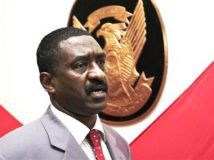African force must quit Darfur by month’s end – Sudan
Sept 13, 2006 (ADDIS ABABA) — Sudan formally called on the African Union Wednesday to pull its peacekeepers out of Darfur by the end of the month if it continues to support a U.N. takeover of the mission.
 A 7,000-strong AU force is now in the western region of Sudan but is understaffed, starved of cash and eager to hand over to the U.N. Its mandate expires at the end of the month.
A 7,000-strong AU force is now in the western region of Sudan but is understaffed, starved of cash and eager to hand over to the U.N. Its mandate expires at the end of the month.
“If the AU wants to transfer the mission to the U.N., then they have to pack up their troops and leave by the September 30,” Al-Samani Al-Wasila, Sudan’s junior foreign affairs minister, told journalists after meeting with AU officials in Addis Ababa.
Sudan first took this stance last week, with Foreign Minister Ali Ahmed Kerti saying the AU force can remain in Darfur only if it accepts Arab League and Sudanese funding. He gave the AU a week to agree or get its troops out, according to a September 4 government statement.
Al-Wasila said Wednesday the AU doesn’t have the authority to transfer the mission and if the 53-member bloc is short of funding, then money can be provided from the Arab League.
The U.N. has been trying to persuade Sudan to allow it to take over the AU peacekeeping force, which has been unable to stop the violence.
But Sudan’s President Omar al-Bashir repeatedly has rejected the proposal, and has said his army would fight any U.N. forces sent to Darfur.
On Monday, U.N. Secretary-general Kofi Annan urged swift intervention by a U.N. peacekeeping force to ease the mounting humanitarian crisis in Darfur.
After years of low-level clan clashes over resources in the impoverished region, ethnic African rebels rose up in 2003, seeking more autonomy in Darfur. The Arab-dominated Sudanese government has been accused of unleashing Arab militiamen known as janjaweed who have been blamed for widespread atrocities, including rapes and killings.
More than 200,000 people have died from war and starvation in Darfur since fighting erupted in February 2003, and Annan said 1.9 million have been displaced.
The violence only escalated after a peace agreement was hammered out in May in Abuja, Nigeria. Only one of several rebel groups signed along with the government, and some of the renewed fighting was blamed on intrarebel disputes.
Annan portioned plenty of blame for Darfur’s current plight on the Sudanese government, demanding it halt an offensive launched August 28 to flush out rebel strongholds in Darfur and warning it would suffer “opprobrium and disgrace” if it doesn’t.
Al-Wasila denied Khartoum had launched a fresh offensive.
The AU’s Peace and Security Council will meet Sept. 18 in New York, just before this year’s General Assembly meeting, to discuss how to break the deadlock in Darfur.
Said Djinnit, the AU Peace and Security commissioner, said at the end of the closed door talks that the Sudanese wanted to make their position clear before the New York meeting.
(AP/ST)
